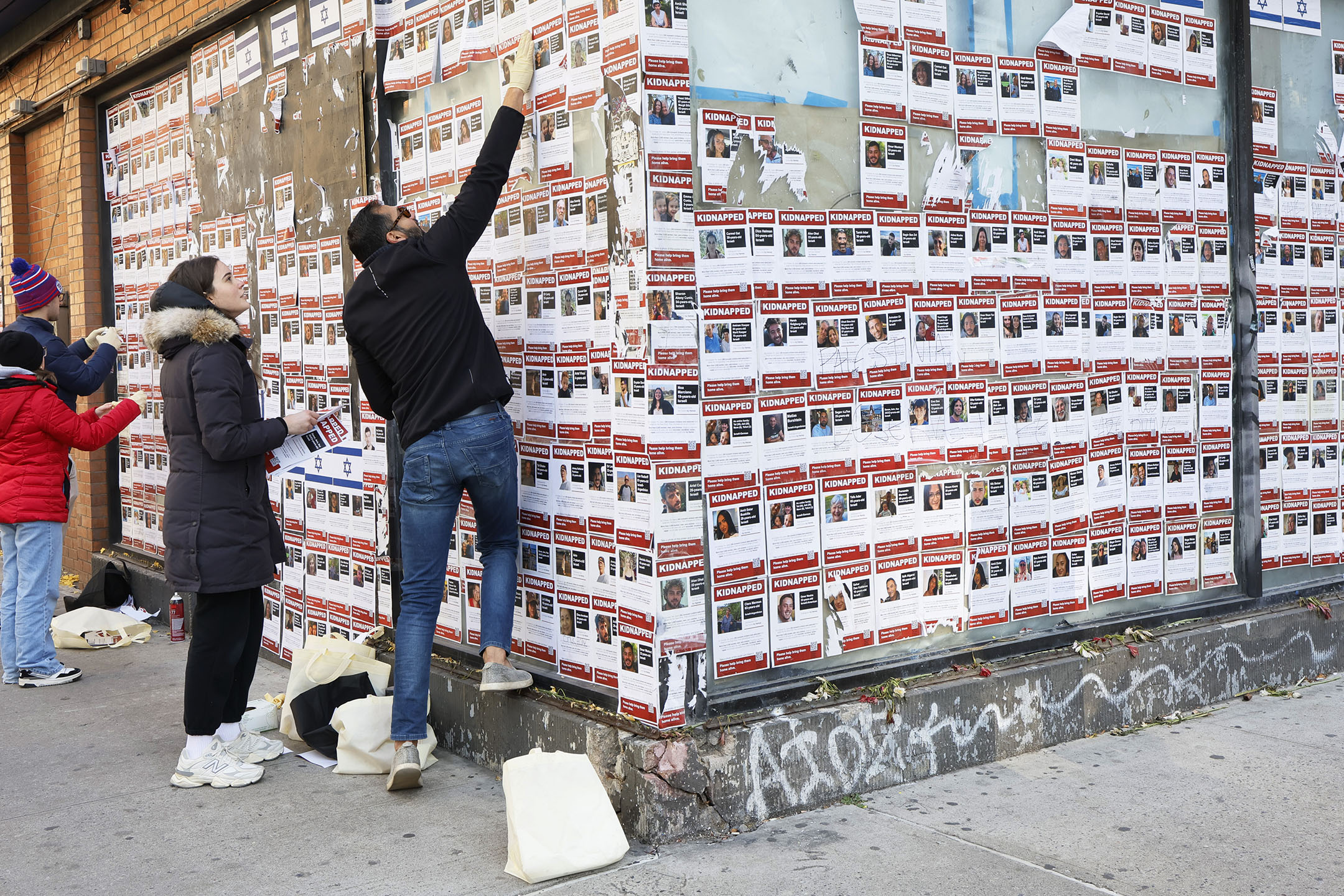Imagine you are nine years old and there are signs all over your New York neighborhood that say “Kidnapped.”
Imagine walking past the face of five-year-old Emilia Aloni every day on the way to school and wondering out loud who checks on her, if she has food, toys and bedtime stories, and if her mom Danielle is there to hug and kiss her.
Imagine having to wonder every day who is working to bring Emilia home, what the kidnappers want in exchange for her freedom, why they are taking children, and “who is responsible for the children” while they are in the dark and terrifying tunnels.
Now imagine that you had been “examining” Emilia for weeks and then found that her face had been torn off the sign. Just the face. “Where did it go?” my daughter asked nervously. Without strength and without the right words, I mumbled a pitiful “Maybe the rain tore it off.” But she was too clever: “The rest of the sign is still there, that doesn’t make sense. Someone doesn’t like her face. What’s the problem?”
The problem was something I hadn’t yet made clear to this child, so confident, self-assured and curious for his age. For eight months, I had avoided the real crux of the story: people hate Jews and it’s the oldest hate in the world.
Now it’s summer 2024. We were on our way to Italy with a stopover in Munich. I realized too late that Taylor Swift would be playing the day we arrived in Munich. Without thinking, we left Munich airport and started looking for concert tickets. Italy could wait 24 hours for a Swiftie pit stop and a crash course in the history of World War II and the Holocaust.
On the way to the Jewish Museum, I quickly explained: “So Hitler took a part of Czechoslovakia. It was not his. And you can’t take what is not yours.” She replied: “So he is like Putin. Maybe they are friends.” I continued: “But in 1938, the friendly countries believed that if they gave Hitler a small part of this country, he would stay there and be happy. And so they let him. The idea is called appeasement. Now we are at least helping Ukraine to kick Russia out.”
Without pausing, she asked, “But are we helping enough?” “No,” I said. And then there was silence.
When we entered the museum, we saw an exhibition of portraits and busts of Munich’s Jews through the centuries. Confronted with story after story, all deeply etched in her memory, my daughter began to imagine the scenarios. A young man whose parents had to give up their department store, another child sewing a Jewish star on her clothes, no more extracurricular activities for others. Children taking the train to safer places where their parents promised to catch up later. Trains, boats and escape plans. Some left, some stayed. Why did they stay? Because it seemed inconceivable that so much evil could exist. And what happened to those who stayed? They were all sent together to live in camps. And then? I’m still at a loss for words.
Downstairs, we looked at artifacts ranging from Torah covers to prayer books, Seder plates and more. She digressed to a 1935 board game, “The Alijah Game,” produced by the Siegfried Sholem printing company for the Berlin-based organization Keren Kayemeth LeIsrael.
With her little finger she traced the stations of the game. “So the Jews started in Munich, went to Venice (where we’re going tomorrow), then visited Athens, went on to Cyprus and arrived in Jerusalem 100 stations later? Israel is the home base?”
Yes, she understood. Israel was a home base for the Jews of Munich, for the Jews before them and, unfortunately, also for the Jews of today and tomorrow.
Israel was the home of the Jews of Munich, the Jews before them and, unfortunately, also the Jews of today and tomorrow.
Fast forward to the next morning. She was reading over my shoulder as I scrolled through Twitter and saw that Tajik judo Olympian Nurali Emomali refused to shake hands with Israeli Baruch Shmailov, after which Japan’s Hifumi Abe dislocated his shoulder and he left crying. Again the questions: “He put in so much work to get to the Olympics. What’s so bad about a handshake? And what did Baruch do wrong?” “Nothing, the problem stems from the same hatred we talked about earlier.” “This is ridiculous, Nurali should have listened to Taylor Swift’s song Karma.”
We continued on to Venice, the impressions of our day in Munich deeply embedded in our minds. Questions and thoughts remained, and she recapitulated our experiences: The abducted children and adults must come back, and someone should be able to bring them home. You can’t take what doesn’t belong to you, and you can’t give in to the tyrants (Hitler and Putin) because they will only take more away from you. Anti-Semitism is absurd and for stupid people. And when things get tough for the Jews, Israel is always and always will be our home base.
Before we turned Taylor Swift’s music back on, she concluded, “One more question. Hitler and Putin were once nine years old. Were they like me, or were they already monsters? If they were like me, what happened?”
Emily Hamilton is Executive Director of Justice for Kurds and producer of three documentaries: Why Ukraine, Slava Ukraini and Glory to the Heroes by Bernard-Henri Lévy about Ukraine’s extraordinary resistance to the large-scale Russian invasion.

